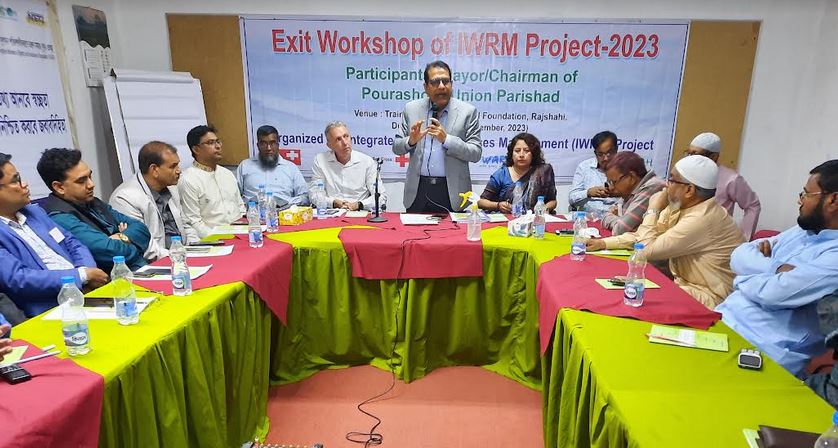
RAJSHAHI, Dec 3, 2023 (BSS) - Restricting indiscriminate extraction of groundwater can be the crucial means of water resource protection in the region, particularly in its water-stressed high Barind tract, for the greater interest of protecting the living and livelihood conditions.
An adverse impact has already been created on the aquifer due to excessive extraction of ground water for irrigation and other purposes in the dried area.
Water resource experts and other stakeholders came up with the observation while addressing the Exit Workshop of IWRM Project at DASCOH Foundation office here today.
On behalf of their Integrated Water Resource Management (IWRM) Project, DASCOH Foundation and Swiss Red Cross jointly organized the workshop supported by Switzerland.
Officials from the line departments and others concerned, including Union Parishad Chairman and Pourasava Mayors, joined the meeting discussing and devising ways and means on how to mitigate the water crises in the region.
Director General of Water Resource Planning Organization (WARPO) Rezaul Maksud Jahedi addressed the meeting as chief guest, while WARPO Project Director Zahid Hossein, Program Manager of Swiss Agency for Development and Cooperation Sabina Yasmein Lubna and SRC Country Coordinator Paul Drossou spoke as special guests.
Prof Chowdhury Sarwar Jahan from the Department of Geology and Mining at Rajshahi University and Chief Executive Officer of DASCOH Foundation Akramul Haque also spoke on the occasion disseminating their expertise on the issue.
Rezaul Maksud Jahedi said the present government has been working relentlessly to ensure water rights to all.
He said the government under the dynamic and visionary leadership of Prime Minister Sheikh Hasina has adopted diversified steps to ensure the water rights as everyone has equal rights to water and an optimum use of water can ensure it.
Rezaul Maksud, however, called for substantial and sustainable promotion of managed aquifer recharge and rainwater harvesting for enriching surface water resources in the Barind area.
In his remarks, Prof Chowdhury Sarwar Jahan told the meeting that people in the region are struggling to get drinking water while many paddy farmers are either diversifying to less water-intensive crops or converting their croplands to ponds.
The region is characterised by decreasing rainfall and depleting groundwater levels, mostly extracted for paddy farming, rice mill operations, and other industrial purposes.
Akramul Haque told the meeting that the integrated water resource management method has been being promoted as special Initiatives in the vast high Barind tract aimed at reducing its existing water-stressed condition.
The IWRM project has been implemented in drought and arsenic affected 39 Unions and three Pourasavas under Rajshahi, Chapainawabganj and Naogaon districts since 2014 supported by Switzerland.
With intervention of the project, eight more canals were re-excavated in the high Barind area aimed at reducing the gradually mounting pressure on underground water through promoting surface water irrigation.
"We have brought the canals with around 4.78-kilometer in length which were derelict and unfit for use under re-excavation in eight upazilas of Rajshahi, Chapainawabganj and Naogaon districts," said Haque.
Around 24,200 people, including 12,544 women and 2,586 ethnic minorities, are being benefited from the canals. The beneficiaries are using the canal water to irrigate 350 hectares of farming fields of wheat, mustard, pulse and other rabi crops as supplementary irrigation.